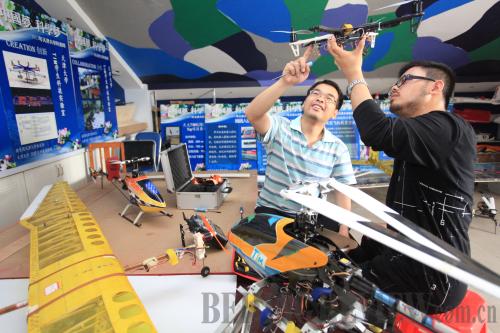|
 |
|
FLY FOR FUTURE: Two students test a drone model at Tianjin University's innovation and business startup education center (LI XIANG) |
China should also urgently make clear the positioning and goals of SOEs. Despite differences in opinions, many people agree that the future of SOEs lies in privatization, or holding a minority share in a mixed-ownership structure. In fact these are only discussions in theory without any evidence from practice. Arguments and discussions should continue, but if the country adopts some policies in haste, it won't help China build a solid organizational foundation to make significant innovations in the medium and long term.
Late-comer disadvantage
Facing a complicated situation, China needs to make innovation more effective. The most important and most challenging thing for the government is to create conditions to overcome the "late-comer disadvantage," besides minimizing factors restricting individuals' enthusiasm of innovation.
Domestic companies have made breakthroughs in independently developing core technologies, but compared with multinational corporations, they are still less favored by the market. That is a "late-comer disadvantage." Late-comer disadvantages will inevitably impede independent innovation and competitiveness of these companies. Even though domestic companies have developed new technologies, it is still hard for them to fully realize their potential. This serves as a barrier to the confidence and motivation of Chinese companies to develop their own core technologies. In fact, a lack of confidence and motivation is the biggest factor constraining independent innovation by Chinese companies.
The late-comer disadvantage also makes it much more difficult to establish industrial chains led by domestic companies. In the primary stage of China's independent technology innovation, Chinese companies mainly develop isolated technologies or single products. During this stage, independent innovation activities are still fragile and not sustainable. In the advanced stage of independent technology innovation, complete industrial support and industrial chains based on domestic resources are established. During this stage, various companies, multiple products and technologies can support and rely on each other, and innovation activities are much more stable with clear targets.
What SOEs should do is to nurture competent professional managers. According to Ning Gaoning, Chairman of the China Oil and Foodstuffs Corp., a precondition for SOEs to succeed is that the senior managers must be willing to look after state-owned assets. "The boss of our enterprises is the country, and we need to look after the assets for our boss and hope the assets can increase in value," Ning said.
For POEs, the core issue is to improve their mode of operation and capacity. Some think it is inevitable for most Chinese POEs to have disadvantages of family businesses. If these are not properly handled, POEs will find it hard to attract high-quality professionals. Therefore they must strive to succeed through continued innovations.
The author is a researcher with the Research Center for Technological Innovation at Tsinghua University
Email us at: yushujun@bjreview.com | 